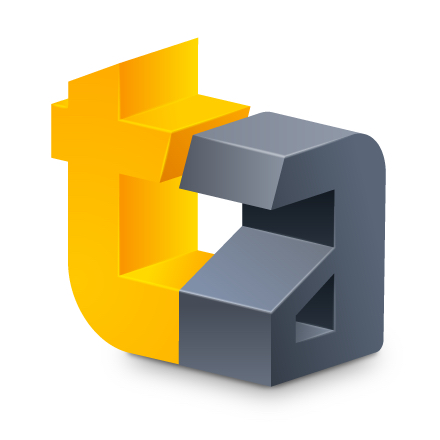 Hello, gentle readers, and welcome to the RPG Reload, the weekly feature where I sometimes have to throw dinner together from scraps of leftovers. While I had planned to do a developer interview this week, my day job has become rather busy all of a sudden. Because of that, I haven’t been able to conduct the interview as I had originally hoped. I gave some thought to the idea of taking a week off, but we haven’t missed a Reload in three and a half years and I don’t plan on changing that. Ultimately, I settled on an early debut for an idea I had been planning: the RPG Reload Glossary. The Glossary is a place where I can define things and go into their histories a little so that you, the reader, know where I’m coming from. I’ll be doing a Glossary entry every month or two as long as I can come up with ideas for it, so if you have anything you want explored, let me know in the comments.
Hello, gentle readers, and welcome to the RPG Reload, the weekly feature where I sometimes have to throw dinner together from scraps of leftovers. While I had planned to do a developer interview this week, my day job has become rather busy all of a sudden. Because of that, I haven’t been able to conduct the interview as I had originally hoped. I gave some thought to the idea of taking a week off, but we haven’t missed a Reload in three and a half years and I don’t plan on changing that. Ultimately, I settled on an early debut for an idea I had been planning: the RPG Reload Glossary. The Glossary is a place where I can define things and go into their histories a little so that you, the reader, know where I’m coming from. I’ll be doing a Glossary entry every month or two as long as I can come up with ideas for it, so if you have anything you want explored, let me know in the comments.
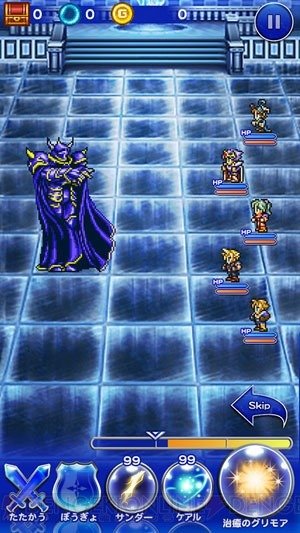
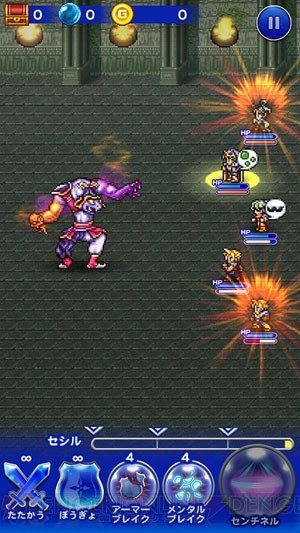
I thought I would kick this series off with a question that has come up now and then in the comments on some stories here at TouchArcade: what is a ‘social RPG’? Since I’m partially responsible for dragging the term into the English-speaking world, I felt I should probably help with the actual definition. The truth is that it’s a fairly broad term, one that is well-understood in Japan, its country of origin, but not nearly as clear outside of that country. I don’t know if it’s going to stick around as a genre label, but since we officially recognize it here at TouchArcade, we’d probably better explain it.
I think we all understand what an RPG is, at least in the basic sense. Since ‘social’ is an English word, you would think it wouldn’t be too hard to sort out the combination of the two. Yet the kinds of games that are classified as social RPGs often have only the barest social elements. What gives? If I can’t even chat with other players, how is it social at all?
In this case, however, the ‘social’ part of the label comes not from its literal meaning, but from another loose genre: the social game. You might be familiar with this kind of game. Born as web browser games and often delivered through social networking services like Facebook, social games are typically free-to-play games that involve some sort of nigh-endless task like building a farm or managing a city. These games will typically have light multiplayer aspects, mostly relegated to showing off your work, pestering your social network friends in exchange for goodies of some kind, or competing to achieve a higher score. These are games like FarmVille, Mob Wars, or The Sims Social. Maybe you play some. Maybe your mom plays some. It feels like their time has largely passed on social networks, but the games themselves have spread and flourished elsewhere.
The Japanese games industry has had their own social games for quite a long time. Sites and services like Mixi, Gree, and Mobage have long offered their own spins on social gaming, often in collaboration with traditional gaming giants like Square Enix, SEGA, and Capcom. With RPGs long being the genre of choice among Japanese gamers, it didn’t take long for a company to mix the idea of a social game with certain aspects of RPGs. Much as Western gamers like to create new genre labels by mashing two game titles together (hello ‘metroidvania’ and ‘soulsborne’), Japanese gamers will often just smash two genre labels together to create a new descriptor. It’s from this tradition that the term ‘social RPG’ was born.
Similarly to the social games they spawned from, social RPGs often have very light social elements, often limited to calling on your friend for support of some kind. This is because they were originally social network games, so it was assumed any chatting or other types of messaging would probably be done directly through the service itself. As the genre has migrated to other platforms, these social aspects haven’t changed much at all, yet their minute presence is a defining element of the genre. That makes the genre label a bit hard to understand for those seeing it for the first time, much like how the ‘arcade game’ genre label doesn’t really have much to do with arcades at all anymore. I suppose that makes it a pretty poor label, but if ‘roguelike’ and ‘metroidvania’ can stick, I feel like just about anything can.
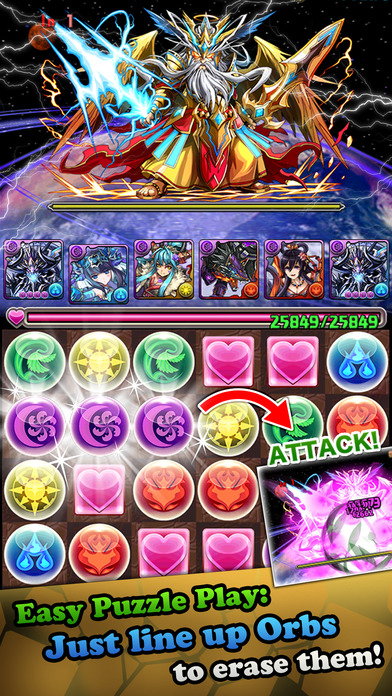
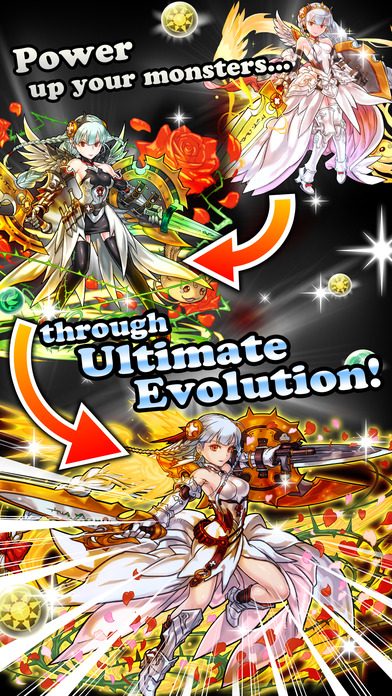
So what is a social RPG? Like other genre labels, it gets fuzzy around the edges, so please don’t take my definition as gospel. But as far as I can tell, a social RPG:
- has leveling up through gaining experience points as its broad goal
- involves clearing increasingly difficult, short single-player challenges via combat of some sort
- leans heavily on an interconnected system of strengths and weaknesses that forces a player to shuffle their party or skills around
- generally focuses on battles rather than any sort of real exploration
- allows the player to create a list of friends who offer support in some way or another
- has a wide array of characters or skills for the player to collect and use
- usually disperses those characters or skills through a random lotto mechanic termed ‘gatcha’
- tiers those characters or skills according to power and rarity
- allows players to evolve or increase the rank of lower-ranked characters or skills by collecting resources
- includes special time-limited challenges that disperse resources or new characters/skills
- puts a hard cap on inventory that ultimately forces the player to invest in lifting the cap if they want to keep collecting
- includes some sort of hard-to-get premium currency that can be used for a variety of purposes
- rarely includes any direct social features such as chat
- may include competitive or cooperative multiplayer as a side mode, often asychronously
- has battle mechanics that can draw from a variety of other genres such as action, puzzle, and so on
- will put experience level and rarity above all other considerations regardless of gameplay mechanics
- is usually free-to-play with a stamina meter
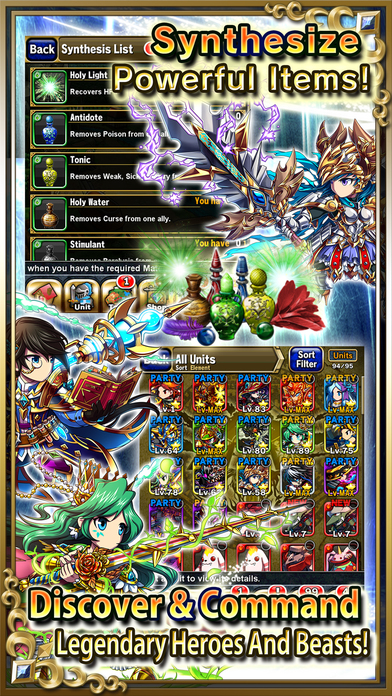
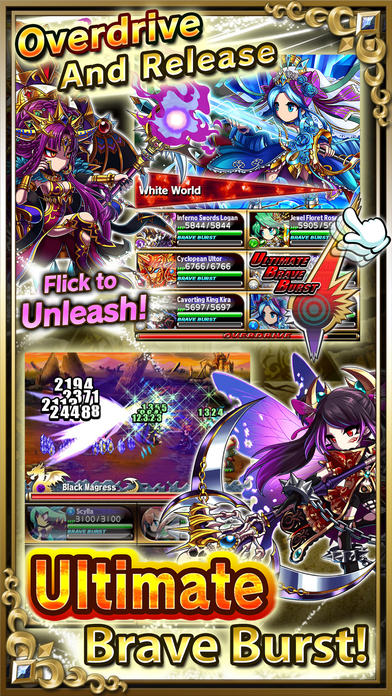
Prominent Examples of Social RPGs:
- Puzzle & Dragons
- Brave Frontier
- Monster Strike
- Terra Battle
- Final Fantasy Record Keeper
- Granblue Fantasy
Not Social RPGs:
- Hearthstone
- Clash of Clans
- Hay Day
- Candy Crush Saga
- My Horse Prince
- Enviro-Bear 2010
- Vainglory
Phew, that’s quite the list. Once you get the hang of it, though, you’ll know a social RPG as soon as you spot it. The main stumbling point people seem to have is in thinking the diverse combat mechanics define these games rather than the party-building systems they’re baked into. No matter what way the combat is expressed in a social RPG, it’s always secondary to the prep work of building a strong team or set of skills. It’s those shared mechanics that define the genre more than anything else.
You might be wondering why we bother to use a label that seems so specific, though. Well, it’s because this particular kind of game is becoming extremely popular and prolific, and while there is certainly some overlap in regular RPG fans and social RPG fans, there are plenty of people who enjoy one and not the other. We want you to be able to tell at a glance exactly which of the two you’re looking at. As I said, I’m not sure if the label is going to stick or not, but it’s what we have to work with at the moment, so we’re going to use it.
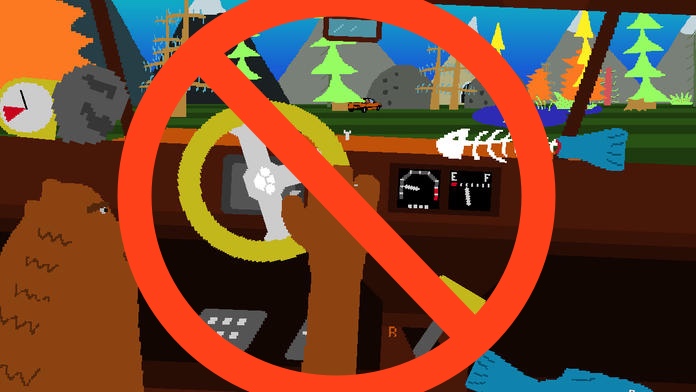
At any rate, I hope that was helpful. I’m hoping to have time to conduct that developer interview for next week, so we should be back to the usual schedule. The RPG Reload Play-Along of Lunar is still going on in the forums, so make sure you stop by the thread and join in on the fun while you can. As for the next Glossary entry, well, I’m going to jump on a serious grenade the next time it rolls around. Please look forward to it. As always, thanks for reading!